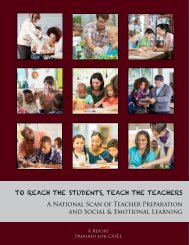Future Ready Learning
7m3sdJ
7m3sdJ
Create successful ePaper yourself
Turn your PDF publications into a flip-book with our unique Google optimized e-Paper software.
Recommendations<br />
Revise practices, policies, and regulations to ensure privacy and information protection while<br />
enabling a model of assessment that includes ongoing gathering and sharing of data for continuous<br />
improvement of learning and teaching.<br />
This will require not only greater systems interoperability standards but also increased capacity on<br />
the part of educators and administrators to understand the types of systems they want to establish<br />
within schools and colleges. In addition, they will need to have an understanding of the standards<br />
of interoperability they should demand from vendors. A key component of this increased<br />
capacity should ensure educational leaders have a firm understanding of privacy and security<br />
concerns, how those concerns are addressed within the school or system, and clear communication<br />
of policies and procedures with all stakeholders. Achievement of this recommendation would<br />
benefit from the involvement and guidance of organizations, such as CoSN, ISTE, and the State<br />
Educational Technology Directors Association (SETDA), that have developed specialized expertise<br />
in these areas.<br />
States, districts, and others should design, develop, and implement learning dashboards,<br />
response systems, and communication pathways that give students, educators, families, and<br />
other stakeholders timely and actionable feedback about student learning to improve achievement<br />
and instructional practices.<br />
The next generation of such tools should integrate across platforms and tools seamlessly, be<br />
designed with a mobile-first mindset, and be guided by UD and UDL principles to ensure accessibility<br />
by all stakeholders. Although current products and dashboards include basic functionality<br />
and features that improve on those of their predecessors, future iterations should be built on a<br />
premise of feedback and conversation, allowing learners and families to discuss learning outcomes<br />
and evidence and increasing agency and ownership across stakeholder groups.<br />
Create and validate an integrated system for designing and implementing valid, reliable, and<br />
cost-effective assessments of complex aspects of 21st century expertise and competencies<br />
across academic disciplines.<br />
Interoperable formative assessment formats offered by major testing consortia for use by educators<br />
throughout the year are an important first step. However, work remains to ensure more educators<br />
have access to high-quality formative assessment tools and to develop additional capacities<br />
to assess both cognitive and non-cognitive skills better. Moving forward, increasing educator<br />
capacity for the design and deployment of valid and reliable formative assessments will require the<br />
concerted efforts of current assessment developers, teacher preparation programs, school systems,<br />
and researchers. Furthermore, colleges and universities will benefit from system-wide reviews of<br />
assessment practices and from ensuring all faculty have deep understandings of key principles and<br />
practices surrounding the design and implementation of effective learning assessments.<br />
Research and development should be conducted that explore how embedded assessment<br />
technologies such as simulations, collaboration environments, virtual worlds, games, and<br />
cognitive tutors can be used to engage and motivate learners while assessing complex skills.<br />
Although some of this research is in its early stages, the way forward will require close collaboration<br />
among organizations—such as GlassLab, Games for Change, and iCivics; colleges, universities, informal<br />
learning spaces, and schools; philanthropic organizations; and research institutions—that have<br />
a deep understanding of how game mechanics increase learner motivation. This collaboration can<br />
lead to the development of more effective and engaging experiences to support learning.<br />
OFFICE OF Educational Technology<br />
63



